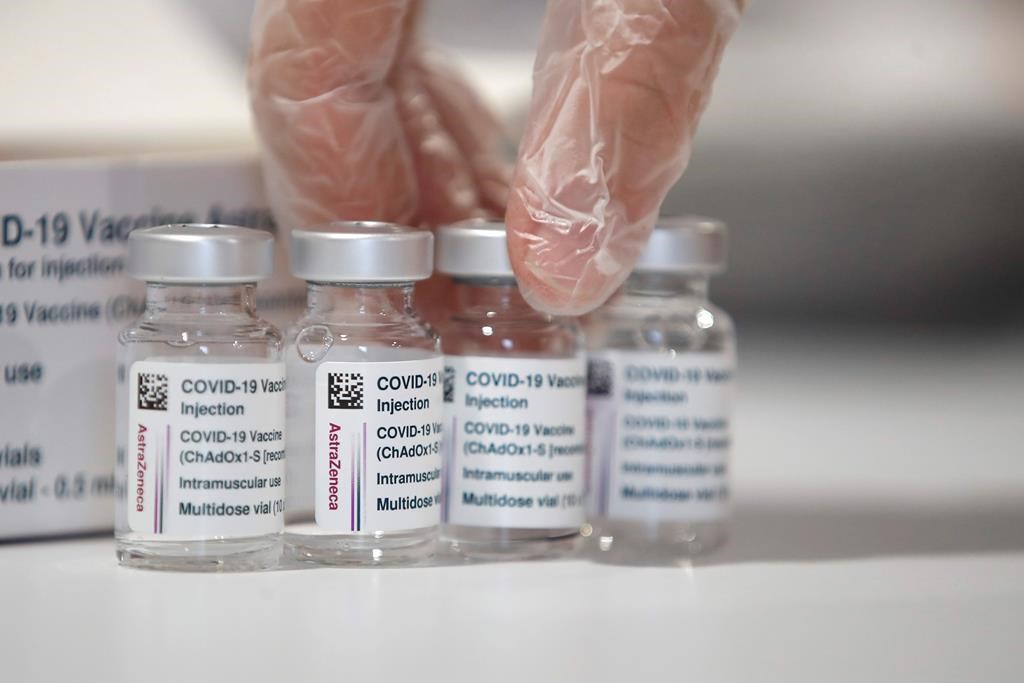
Canada’s procurement minister says a deal is close to receive Oxford-AstraZeneca vaccine doses from the U.S., while the military commander in charge of the rollout here says all adults who wish could be able to get their first shot by July 1.
Posted Mar 19, 2021, 05:28AM EDT
Canada’s procurement minister says a deal is close to receive Oxford-AstraZeneca vaccine doses from the U.S., while the military commander in charge of the rollout here says all adults who wish could be able to get their first shot by July 1.
“After numerous discussions with the Biden administration, Canada is in the process of finalizing an exchange agreement to receive 1.5 million doses of the AstraZeneca vaccine from the U.S.,” Anita Anand said on Twitter on Thursday.
“We look forward to providing an update to Canadians once the details are finalized.”
White House press secretary Jen Psaki said earlier that another 2.5 million doses would go to Mexico, but the details were still being worked out.
The United States currently has seven million “releasable” doses of the vaccine, which has yet to receive approval from its Food and Drug Administration, she said.
The loan would be in lieu of a future exchange of doses from Canada and Mexico, Psaki said – either of the AstraZeneca vaccine or a different one.
Premier Ford heard the news while at a press conference and said “God bless America” in response.
WATCH: https://toronto.citynews.ca/2021/03/18/u-s-lending-canada-mexico-astrazeneca-covid-19-vaccine/
“They’re coming to our rescue. Thank God. I’ve been bugging Trump, I’ve been bugging Biden — all of them. They must get sick of Doug Ford asking for help,” he said.
In January, Ford appealed directly to Biden to help Canada by sending a million doses of the Pfizer-BioNTech vaccine from a plant in Michigan.
Ford said today that he understands the United States would vaccinate its own citizens first, but he’s grateful they’re now trying to help their allies.
“President Biden, thank you … that’s what true neighbours do, you help each other out in a crisis,” he said.
U.S. President Joe Biden did not address the vaccine exchange when he updated Americans on that country’s vaccination progress.
He said the U.S. will have administered 100 million shots by Friday and that the country is on track to have enough vaccine supply to inoculate all adult Americans by the end of May.
Last week, Canadian provinces began administering 500,000 doses of the version of the AstraZeneca vaccine produced at the Serum Institute of India.
The federal government has purchased 20 million doses directly from AstraZeneca, but did not have a timeline for when they would arrive.
Regulators in Europe and the United Kingdom have concluded the benefits of the AstraZeneca vaccine outweigh the risks, but both are still studying whether the shot had any link to a small number of rare brain blood clots.
Earlier Thursday, Maj.-Gen. Dany Fortin, who is overseeing Canada’s vaccine program logistics, said provinces should have enough doses by the end of the next quarter for everyone who wants to be vaccinated.
But he later clarified that depends on provinces continuing to delay second doses up to four months so that more people can get their first shot sooner, as well as supplies coming in as planned.
“While there is no indications of disruptions or fluctuations in the production, it is a pandemic with global demand on vaccines that are produced as rapidly as possible,” Fortin said in Ottawa.
“We are always subject to fluctuations in the production and the challenges of a complicated supply chain across the world and into this country.”
Although initial deliveries from Johnson & Johnson and shipments directly from AstraZeneca are still in limbo, there is more than enough from Pfizer-BioNTech, Moderna and the Oxford-AstraZeneca vaccine made in India to pass the one-dose-per-person target by the end of June.
Procurement numbers show there are 36.5 million doses confirmed to be shipped by June 30. Only people over the age of 16 can currently be vaccinated and about 31 million Canadians are in that age group.
Ottawa still says Canadians will be fully vaccinated by the end of September.
Canada’s deputy chief public health officer Dr. Howard Njoo said almost seven per cent of Canadians have now received at least one dose of a COVID-19 vaccine, and 1.6 per cent have received two doses. The vast majority of doses given in the past two weeks have been first shots.
with files from News Staff, Mia Rabson in Ottawa, James McCarten in Washington and Shawn Jeffords in Toronto.





